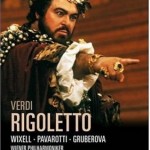1982, Unitel Films
(Ingvar Wixell, Luciano Pavarotti, Edita Gruberova, Ferruccio Furlanetto Victoria Vergara; Wiener Staatsopernchor; Wiener Philharmoniker, cond. Riccardo Chailly)
(dir. Jean-Pierre Ponnelle)
This film, shot in various Italian palaces and other Renaissance-flavored locations, was my introduction to Rigoletto. For that reason it will always have a place in my heart, but it’s a controversial film and understandably so. This Rigoletto is very much a melodrama, with little subtlety to its storytelling. Rigoletto’s jester garb is bright red with devil horns on the hat, while Gilda is the epitome of girlish purity, always dressed in white and with flowing blonde hair. The Duke’s Act I “ball” is a grotesque Roman-style orgy full of nonstop laughter, bad table manners and couples humping on the floor. The ‘Cortigiani’ scene takes place in the Duke’s bedroom rather than outside it, with Rigoletto’s cries of “She is there!” referring to the bed. In a touch of ham-fisted symbolism the same singer portrays both Rigoletto and Monterone (a feat only possible on film, obviously), and throughout the opera, the half-crazed Rigoletto “sees” visions of Monterone, Sparafucile, and all his other fears as he sings of them. Not that the film is too melodramatic to be gripping: the performers are outstanding, the settings and camerawork are magnificently atmospheric, and the tragedy retains its power. But still, Ponnelle’s highly theatrical conception of the work is definitely “love it or hate it.”
Ingvar Wixell is a slightly unusual choice for the ultimate Italian baritone role of Rigoletto: a blondish-haired Swede with a fairly small, gritty voice. But apart from slightly underwhelming high notes, his performance is a tour-de-force. His vibrant acting brings the iconic jester to life in all his leering humor, profound bitterness, love, tenderness, paranoia, rage, anguish, and rich humanity. He also makes a wonderfully fiery Monterone, even if he lacks the vocal gravitas of a bass. Luciano Pavarotti, the film’s star attraction from a marketing standpoint, is likewise a near-ideal Duke. Though he obviously lacks the physique du role (how does Rigoletto mistake the slender body in the sack for his?) his legendary voice rings like a golden bell and he makes the most of his character’s joyous, charismatic lechery. Edita Gruberova, though her acting is the “stagiest” in the film, is a tender, affecting Gilda, with a deliciously pure, sweet and fluid soprano. Ferruccio Furlanetto, barely recognizable with scraggly caveman-like hair and rotten teeth, is an eerie, rumbling-voiced Sparafucile, and Victoria Vergara an appropriately sultry Maddalena. The supporting cast is excellent all around, with veteran mezzo Fedora Barbieri providing an especially vibrant cameo as Gilda’s treacherous nurse Giovanna. Riccardo Chailly leads the Vienna Philharmonic in an expertly dramatic reading of the score, which is performed uncut.
This Rigoletto obviously won’t suit everyone’s taste, but I still recommend it wholeheartedly, especially to newcomers to opera. True, it’s melodramatic and quirky, but nonetheless, its first-class array of performers and its decadent Renaissance atmosphere bring Verdi’s tragedy to life.
Production Clip: “Bella figlia dell’amore” (Pavarotti, Vergara, Gruberova & Wixell)




